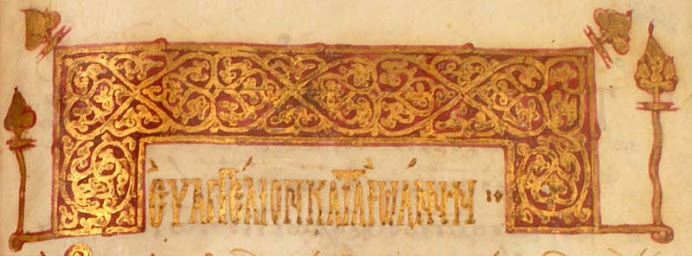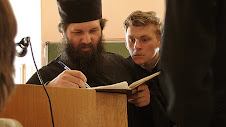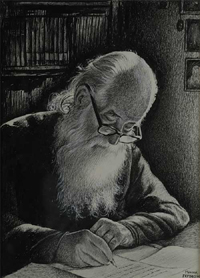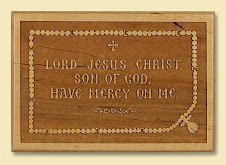 Our English word "tradition," as is well known, comes from the Latin tradere, meaning to hand over or deliver. The Greek paradosis and the Slavonic predanie have precisely the same meaning: tradition is that which is passed on, delivered. Recall, for instance, I Corinthians 15: 3-4: "For I delivered [paredoka, literally "traditioned"] unto you first of all that which I also received, how that Christ died for our sins according to the scriptures; And that he was buried, and that he rose again the third day according to the scriptures." As we see from St Paul's words, our entire faith is based on the Tradition we have received from the Apostles, which has since been passed down from generation to generation, gaining further expression and articulation along the way. Of essential importance to those of us in the West is that Tradition can only be inherited, not invented. We can't make ourselves Orthodox, we have to be made Orthodox.
Our English word "tradition," as is well known, comes from the Latin tradere, meaning to hand over or deliver. The Greek paradosis and the Slavonic predanie have precisely the same meaning: tradition is that which is passed on, delivered. Recall, for instance, I Corinthians 15: 3-4: "For I delivered [paredoka, literally "traditioned"] unto you first of all that which I also received, how that Christ died for our sins according to the scriptures; And that he was buried, and that he rose again the third day according to the scriptures." As we see from St Paul's words, our entire faith is based on the Tradition we have received from the Apostles, which has since been passed down from generation to generation, gaining further expression and articulation along the way. Of essential importance to those of us in the West is that Tradition can only be inherited, not invented. We can't make ourselves Orthodox, we have to be made Orthodox.The late Metropolitan Laurus was someone who lived entirely within Tradition: he was made Orthodox by generations now long gone, and has made several generations of clergy, monastics, and faithful Orthodox by passing on to them the Tradition he himself had inherited. The future Metropolitan, since he was raised in the monastery in Ladomirovo from childhood, was one of the last living contemporaries of the generation of clergy and faithful formed by the Russian Church before the Revolution: he knew every notable figure in the Russian Church emigration from Metropolitan Anastassy onwards, and inherited from them an extraordinary wealth of wisdom.
Vladyka Laurus always remembered his indebtedness to those who had formed him spiritually. On every anniversary of the repose of a notable figure he had known, he would make an announcement at the noon meal in trapeza, relaying what he remembered of them and, most importantly, what he had learned for them. The monastic brotherhood and seminarians would then sing Eternal Memory in their honor. By this means, new generations were able to inherit at least some part of the Tradition the Metropolitan embodied. It was always especially touching to watch Vladyka look at old photographs: he could nearly always identify and share anecdotes about everyone pictured. The past was, for him, as alive as the present.
As is often repeated, Tradition is living and regenerative, and Vladyka Laurus was in no way lost in the past. He kept a diary every day, recording the day's events and noting whom he had met – and he was not likely to forget any of it. He was able to recognize and remember people after a single meeting, and was able to ask them about details of their lives. Whenever he spoke with me, he asked how my father (whom he had ordained) was doing, how the rest of my family was (even remembering the utterly obscure city in which they live), and how my studies were progressing. Although I didn't even register as a footnote in his life, he knew everything essential there is to know about me. Indeed, he valued and praised each person's individual talents, whatever they were, so long as they were used for God's glory.
What makes Vladyka's passing so difficult is that he was one of the last remaining bridges connecting us to a past that is otherwise largely inaccessible. Yet we can remain comforted that Tradition continues to live in the Church, that God will never abandon us, and that He can raise children of Abraham from our generation of the stone-hearted. As Kevin P. Edgecomb put it so perfectly in a comment: "He merely rests in the Lord and awaits us in Paradise! When Elijah left, a double portion was given to Elishah. Be comforted that we can look for wonders to come."
Once again: May his memory be eternal!
Photograph, from left to right: Archbishop Alypy of Chicago, Archimandrite Flor, Archimandrite Kirprian (Vladyka's spiritual father), Metropolitan Laurus, unknown (to me at least). Jordanville, 1940s.









No comments:
Post a Comment